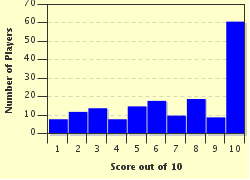Quiz Answer Key and Fun Facts
1. It is said that it's good to have friends or relatives in high places, both in an office and in the army. This was the case of the commander of the 33rd Virginia Infantry, a first cousin once removed of General Robert E. Lee. Who was he?
2. Massachusetts was a Union state during the Civil War, yet there was a Confederate General born in this state. What was his name?
3. The Battle of Seven Pines, on May 31, 1862 was the one that opened the way for the emergence of Robert E. Lee as commander of the Army of Northern Virginia. This battle was also the one that claimed the life of another Northern-born Confederate General, this time from Ohio. To whom am I referring?
4. As strange as it might seem, one of the most hearty friends of CSA President Jefferson Davis was a Confederate general that hailed from Pennsylvania. About his death, Davis remarked that that he was a "true friend and Christian gentleman" and "a gallant soldier". About whom did Davis make the statement?
5. If you study Civil War politics and foreign relations of the belligerents, you are perhaps familiar with the names of James M. Mason and John Slidell, CSA ambassadors to the United Kingdom and France, respectively. Yet, the Confederacy had sent another envoy to the Native Americans, who signed treaties with them and formed a brigade with Indian soldiers. Who was he?
6. There are enough cases in American history where a general who offered significant services to his state ran for governor and was elected. This was the case of a Louisianian, who was elected Governor of his state during the war, in 1864. Who was he?
7. A general always has his staff. General Lee's one was a small cadre of men, who had to carry out many important jobs. To this cadre belonged his chief aide-de-camp. What was his name?
8. Speaking of staffs, we should emphasize on General Jackson's one. His chief-of-staff was also a theologian and one of the most influential scholars of Southern Presbyterianism. What was his name?
9. Heroic and memorable quotes are often produced in wartime. For example, "The post of danger is certainly the post of honor". Who was the Confederate general that uttered this quote?
10. "It is well that war is so terrible, otherwise we should grow too fond of it." Thus spoke General Lee on December 13, 1862 as the Battle of Fredericksburg commenced. On the same day, he said about a young artillerist "It is glorious to see such courage in one so young." About whom did General Lee make that statement?
Source: Author
DeepHistory
This quiz was reviewed by FunTrivia editor
bloomsby before going online.
Any errors found in FunTrivia content are routinely corrected through our feedback system.

